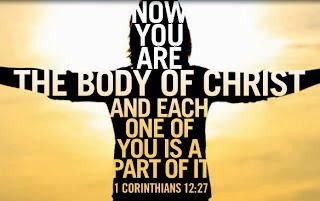Once we begin to understand how the gospel creates peace, mocks our vain claims to self-importance, and teaches us to live as agents of joy and delight in the world, how will these truths begin to create unity among the bickering factions of Christianity?
Let me propose four ways the gospel creates unity in the church.
First, the gospel teaches us that truth is only true if carried out in love.
 While we can agree that there is no love without truth, it is essential for doctrinally-minded Christians to remember that there also is no truth without love. True truth will always express itself in love.
While we can agree that there is no love without truth, it is essential for doctrinally-minded Christians to remember that there also is no truth without love. True truth will always express itself in love.
If you are warring and fighting with your brother, especially over doctrine, it is probably a good indication that you have misunderstood the truth of that doctrine. True doctrine and theology leads always and only to love (1 Cor 13).
Second, the gospel brings peace to the various sides of the “works vs. faith” debate.
The debate has raged over whether or not the gospel requires works as a way to earn, keep, or prove one’s eternal life.
Yet this debate comes from a simple categorical mistake of confusing a small part of the gospel with its entirety. If two people are arguing about what qualifies as true “fruit” and one has apples in mind and the other has oranges, but they keep using the world “fruit” the argument quickly becomes quite messy.
Gospel debates are like that. The gospel is a wide-ranging message about what God has done for the entire world through the life, teachings, crucifixion, death, burial, and resurrection of Jesus Christ. It not only contains truths about how a person can go to heaven when they die, but also about how a follower of Jesus can live here on earth.
So if one person is thinking only about the parts of the gospel that tell a person how to go to heaven when they die or receive eternal life (faith alone in Christ alone), while another person is thinking about the parts of the gospel which tell followers of Jesus how to live on this earth (discipleship, obedience, faithful living), but both persons keep using the term “gospel,” the argument quickly becomes quite messy. But when we understand that the gospel contains both truths, about how to receive eternal life and properly live this life, then we can stop arguing about the role of faith and works in the gospel and see that both have their proper place with proper results.
Third, the gospel is about learning more about Jesus AND doing more with Jesus
 When we see that the gospel contains a whole host of truths and doctrines to believe and teach and also a broad spectrum of behaviors to practice and obey, those who believe Christians should be listening to more sermons and attending more Bible studies can nod and smile toward those who prefer to be out feeding the poor and tending the sick, and vice versa.
When we see that the gospel contains a whole host of truths and doctrines to believe and teach and also a broad spectrum of behaviors to practice and obey, those who believe Christians should be listening to more sermons and attending more Bible studies can nod and smile toward those who prefer to be out feeding the poor and tending the sick, and vice versa.
Both sides recognize that if they are truly following the gospel, there will come a time when their roles must reverse, or at least become more balanced.
There is a time to study, and a time to serve; a time to learn, and a time to love.
The gospel reminds us that we are all one family
Ultimately, the gospel teaches us that no matter what, we are all one family. And just like any family, there will be internal disagreements, struggles, and arguments. There may need to be some discipline that takes place, some separations that must occur.
But when these arguments and breakups happen, the gospel reminds us that we are still family, and that despite our hurt feelings, theological disagreements, and interfamily strife, the goal of the gospel is reconciliation and redemption, not just of each of us to one another, but ultimately and eventually, the redemption and reconciliation of all things under the Lordship of Jesus Christ.
But church unity is not easy
None of this means that the development of unity is easy. In fact, unity is a bit like humility: both vanish the moment you think you’ve achieved it. Unity, like humility, can never be our goal. Unity is a byproduct of living within the gospel.
Unity occurs naturally as a result of following Jesus as He leads us into peace with God and each other, into a gentle mocking of our own pride and ambition, and into a full-fledged delight at the beauty and wonder of life in this world.
When viewed this way, the gospel is a truth that binds us all together in unity, whether we are high church or low church, mega church or house church, or some mixture in between. The gospel is not something that divides, but unites, and brings us together into the unity of the faith.
 Want to learn more about the gospel? Take my new course, "The Gospel According to Scripture."
Want to learn more about the gospel? Take my new course, "The Gospel According to Scripture."
The entire course is free for those who join my online Discipleship group here on RedeemingGod.com. I can't wait to see you inside the course!




How we need this unity.
Thank you for this (always) timely reminder.
You might want to consider Eric’s thoughts..
http://eric-carpenter.blogspot.com/2014/03/lust-for-power-is-biggest-divider.html
Much needed article, Jeremy. The disunity within the factions is unbecoming of people who are called by Christ’s name. Your mention of self importance as well is key. I believe that’s one of the things that hinder unity.
Yes,yes,yes
Hey Jeremy
4 Ways the Gospel Creates Unity in the Church added value to my day. It was a gentle reminder to get the proportions right. Really, it’s like you say, we should live as joy-agents and add hope and positive qualities to the world.
Love is like the salt in our food. Without it, life is tasteless. Once, we add a small portion it spreads out and adds flavour to all the corners.
The verse you mentioned (1 Cor 13) is vital for this topic. Fighting and anger is always the big loser when we look at life from a bigger perspective.
I belong to those who advocate for a golden middle way in most
Biblical discussions, also the works vs. faith debate. I believe you have a legitimate point when you’re talking about the categorical mistake.
My favourite part of the blog post was this sentence: “There is a time to study, and a time to serve; a time to learn, and a time to love.” – not to neglect all the other great points, but really, this is what’s it’s all about, living a Godly life with balance.
The church should be something that unites, not a divide-instance.
On Wednesday I’ll give this post a share on my social media accounts.
Kind regards,
Edna Davidsen
Thanks, Edna. And thanks for sharing the post. I am thrilled that you seek to find that golden middle way in your own discussions and writing.
Good word! We all come together to make up one body!